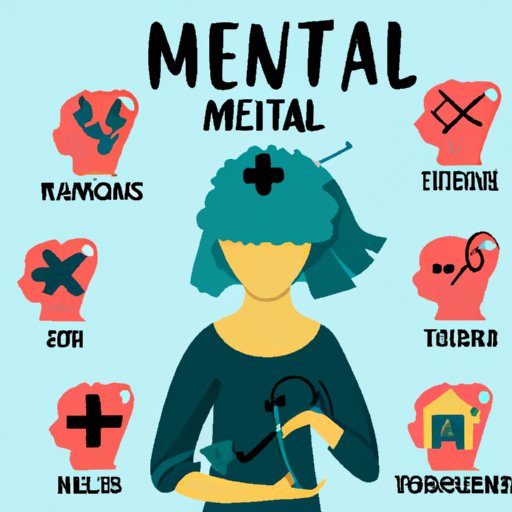Introduction
Mental health is an important part of overall wellbeing. It refers to our emotional, psychological, and social well-being. It affects how we think, feel, and act. It also helps determine how we handle stress, relate to others, and make choices. Mental health is essential to every stage of life, from childhood and adolescence through adulthood.
In this article, we will explore what mental health is, the different types of mental health disorders, the causes and symptoms of mental illness, the benefits of a healthy mental state, how to promote positive mental health, and how to cope with mental illness. We will also look at the various treatment options available.

Exploring the Different Types of Mental Health Disorders
Mental health disorders are conditions that affect a person’s thinking, mood, and behavior. They can range from mild to severe and can be short-term or long-term. The most common types of mental health disorders include anxiety disorders, mood disorders, eating disorders, personality disorders, and schizophrenia.
Anxiety Disorders
Anxiety disorders are marked by excessive fear and worry that can interfere with daily life. Examples of anxiety disorders include generalized anxiety disorder, panic disorder, social anxiety disorder, and specific phobias.
Mood Disorders
Mood disorders involve persistent feelings of sadness, emptiness, or irritability. Examples of mood disorders include major depressive disorder, bipolar disorder, and seasonal affective disorder (SAD).
Eating Disorders
Eating disorders involve an abnormal relationship with food, often characterized by an unhealthy preoccupation with food and weight. Examples of eating disorders include anorexia nervosa, bulimia nervosa, and binge eating disorder.
Personality Disorders
Personality disorders are characterized by inflexible patterns of thinking, feeling, and behaving that cause distress and impair functioning. Examples of personality disorders include borderline personality disorder, narcissistic personality disorder, and antisocial personality disorder.
Schizophrenia
Schizophrenia is a serious mental disorder that affects a person’s ability to think clearly, manage emotions, and interact socially. Symptoms of schizophrenia include delusions, hallucinations, disorganized speech, and disorganized behavior.
Causes and Symptoms of Mental Illness
The exact cause of mental illness is not known, but there are several factors that may contribute to its development. These include biological factors such as genetics, brain chemistry, and hormone levels; psychological factors such as trauma, stress, and negative thought patterns; and environmental factors such as family dynamics, poverty, and substance abuse.
Common symptoms of mental illness include changes in mood, changes in behavior, difficulty concentrating, changes in sleep patterns, changes in appetite, feelings of hopelessness, feelings of guilt, and thoughts of suicide.

The Benefits of a Healthy Mental State
Having a healthy mental state can have many benefits. It can lead to improved relationships, increased productivity, enhanced creativity, and improved physical health. People who maintain a healthy mental state are better able to cope with stress, make decisions, and form meaningful connections with others.

How to Promote Positive Mental Health
Promoting positive mental health involves taking steps to maintain a healthy lifestyle. This includes exercising regularly, maintaining a healthy diet, developing meaningful relationships, practicing positive self-talk, getting enough sleep, setting realistic goals, and taking time out for yourself. If needed, seeking professional help is also beneficial.
How to Cope with Mental Illness
Living with a mental illness can be challenging, but there are ways to cope. These include finding support, identifying triggers, learning stress management techniques, and engaging in activities that bring joy. It is also important to remember that recovery is possible and to never give up hope.
Treatment Options for Mental Health Issues
Treatment for mental health issues can include psychotherapy, medication, and holistic approaches. Psychotherapy involves talking with a therapist to identify and work through underlying issues. Medication can be used to manage symptoms, while holistic approaches such as yoga, mindfulness, and meditation can help reduce stress and improve overall wellbeing.
Conclusion
Mental health is an important part of overall wellbeing. It affects how we think, feel, and act. Mental health disorders can range from mild to severe and can be short-term or long-term. The causes of mental illness can vary, but they often involve biological, psychological, and environmental factors. Having a healthy mental state can have many benefits, such as improved relationships, increased productivity, and enhanced creativity. To promote positive mental health, it is important to take steps to maintain a healthy lifestyle. Finally, treatment for mental health issues can include psychotherapy, medication, and holistic approaches.
Mental health is something that should be taken seriously. It is important to understand the different types of mental illnesses, the causes and symptoms, and how to cope with them. Taking care of your mental health is just as important as taking care of your physical health. If you or someone you know is struggling with a mental illness, seek help from a qualified professional.
Conclusion
In conclusion, mental health is an important part of overall wellbeing. It affects how we think, feel, and act. There are many different types of mental health disorders, and the causes and symptoms can vary. It is important to recognize the signs of mental illness and to take steps to promote positive mental health. Treatment for mental health issues can include psychotherapy, medication, and holistic approaches. Everyone should take care of their mental health, as it is just as important as taking care of your physical health.
(Note: Is this article not meeting your expectations? Do you have knowledge or insights to share? Unlock new opportunities and expand your reach by joining our authors team. Click Registration to join us and share your expertise with our readers.)
